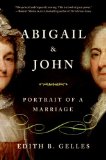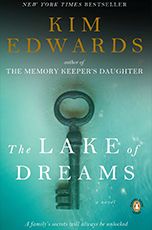Book Review: Abigail & John: Portrait of a Marriage
 By Edith Belle Gelles
By Edith Belle Gelles
William Morrow ©2009 | Hardcover 352pgs
Volumes have been written about the vital role that John Adams has played in the history of the United States of America, and Abigail Adams herself has been the subject of several in-depth biographies. But, Abigail & John: Portrait of a Marriage portrays the life of one of America’s first couples, framed by their loving and enduring marriage. Much has been made of the Adamses’ public life, yet Abigail & John draws a more intimate portrait, illustrated by passages of their private correspondence. Though this book may not cover any fresh ground historically, it gives a wonderful sense of the Adamses as partners, lovers and patriots.
Their marriage was a love match and Abigail was a young bride; at just 19, she was 10 years John’s junior. Their shared religious background, based on Puritan laws and rules of behavior, provided a foundation for their life together, and served as a framework for raising their family. “Duty, in the Puritan sense of virtue and sacrifice, service and love, was the foundation of a good life.” These themes of duty and sacrifice would continue throughout the Adamses’ lives, and sustain them through times of war and lengthy separations.
Though in many ways theirs was a traditional 18th century marriage, there were some very modern elements to it. John truly valued Abigail’s opinion, often treating her as his closest confidante, and openly discussing the pressing political issues of the day. In his wife and children, he saw the greatest reason to keep fighting for American independence. In fact, it was the birth of his oldest daughter, Abigail, that prompted him to write his first great essay, A Dissertation on the Canon and Feudal Law. This seminal work, which argues “Liberty cannot be preserved without a general knowledge among the people, who have a right, from the frame of their nature, to knowledge”, was written while John nervously listened to the sounds of his wife’s labor in the bedroom upstairs.
As their family grew, and John built a reputation as a lawyer and statesman, the couple entered the most difficult period of their marriage. His appointments to the Continental Congress, and later as minister to France and the Netherlands required years of painful separation for the family. Their only connection was a thin stream of heartfelt letters sporadically sent across the Atlantic. Abigail “considered herself like Penelope awaiting her Ulysses and just as uninformed.” With John away, she was forced into an un-traditional role as a wife and mother. Abigail had to run their farm, manage their finances and monitor their children’s education, all alone. She bore this burden because she “believed even more firmly that the American Revolution would founder without John’s active participation.” Again, the couple’s sense of duty would come before any personal comfort.
By the summer of 1788, John was happily reunited with Abigail and their family in Boston, and his sights were set on building a new American government. This would be a fresh and challenging chapter in the Adamses’ marriage. Though John remained passionate about the direction he felt the new leaders should take in governing their country, he was deeply frustrated by the obstacles and political in-fighting that he struggled with in the nation’s capital. As the first Vice President, a position he called “the most insignificant office that ever the Invention of Man contrived”, and later as President, John encountered violent opposition from political adversaries as well as the press. One of the few bright spots was having Abigail at his side. Ever his defender and protector, Abigail would sometimes plant positive stories about John in the press, to counteract the vitriol printed daily in the broadsheets.
As Abigail & John comes to a close, and the Adamses retire from public life and return home to Massachusetts, a new admiration is gained for the couple. In telling the story of their marriage, Gelles underscores the private pain and personal sacrifice these remarkable individuals suffered for their God, family and country. No longer are they stiff historical figures, but living, breathing and feeling people who helped birth a nation. What sustained them through it all was an enduring love, a love that spanned decades and continents, and stayed with them to the end of their days. Shortly before her death, Abigail wrote her to her sister Elizabeth: “After half a century, I can say, my choice would be the same if I again had youth. And the opportunity to make it.”
Already read the book? Leave a comment below and tell us what you think.


The book was well researched and written. Loving history was one of the reasons I chose to read this book and I was not disappointed. It was enlightening to read about Abigail, her strength and devotion to John and the part she played in the founding of our great country.